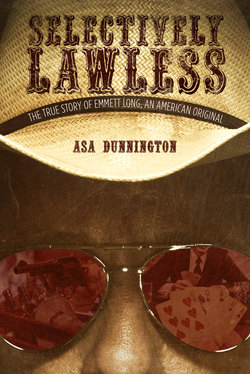Читать книгу Selectively Lawless - Asa Dunnington - Страница 6
На сайте Литреса книга снята с продажи.
ОглавлениеForeword
The Wild West provides some of the most enduring tenets of American mythology,” journalist E. L. Hamilton once wrote. “And no wonder: the lawlessness of the time provided plenty of drama, and the lonely windswept territories, mountainous and arid, provided the cinematic backdrop.”
True enough, but the fact is that the mythic outlaw of the frontier cannot be confined to the time and place where he first entered American popular culture. That’s what we discover in the pages of Selectively Lawless by Asa Dunnington, the saga of a remarkable man named Emmett Long: “a rancher by profession and a gambler by passion,” but also the proprietor of a speakeasy and a brothel, a bank robber, a moonshiner, a card shark, and much else besides—an authentic American original.
Born in the small town of Pottsboro, Texas, in 1904, Emmett was one ranch hand with an early appreciation for the internal combustion engine. He’d been breaking horses since he was eight years old, but what he longed to ride at the age of sixteen was not an old paint but a motorcycle called the new Indian Scout. So Emmett was a kind of urban cowboy of the early twentieth century, even if many of his exploits recall the wildest days of the Old West.
Emmett is shown to possess exactly the kind of dangerous edge that we expect to find in a Western badman. “Heaven help the man who crosses Emmett Long,” warns Dunnington. But Emmett is also a sly dog and a trickster, a man who is able to deploy a cutting sense of humor at the most awkward of moments. For that reason, Dunnington shows us scenes of jaw-clenching tension as well as scenes that make us laugh out loud, and often both at once.
Emmett may have been only a selective outlaw, but he seems to have spent a good deal of his long life on the wrong side of the law. The company he kept ranged from Pretty Boy Floyd in the thirties to Benny Binion in the sixties. Still, he turns out to be the kind of rogue whose sheer charisma we cannot help but admire. To his credit, Dunnington allows us to see Emmett’s winning qualities, his kinder and gentler side, his encounters with love and loss, and his ultimate moment of redemption from his life of crime.
Dunnington first heard some of the stories “from the horse’s mouth” in Emmett’s old age and others from Emmett’s daughter (and Dunnington’s cousin-in-law), Mattie Bloomquist. Now he shares them with his reader in the engaging and compelling style of a storyteller around a campfire. And he shows us an outlaw who is unlike any of the characters we have encountered before. Emmett Long may remind us of the outlaws we meet in books and movies, but Selectively Lawless has the irresistible ring of the real thing.
— Jonathan Kirsch
